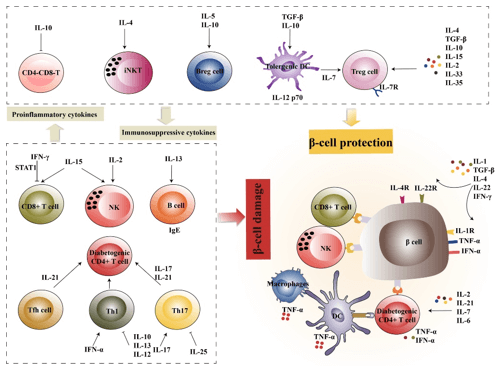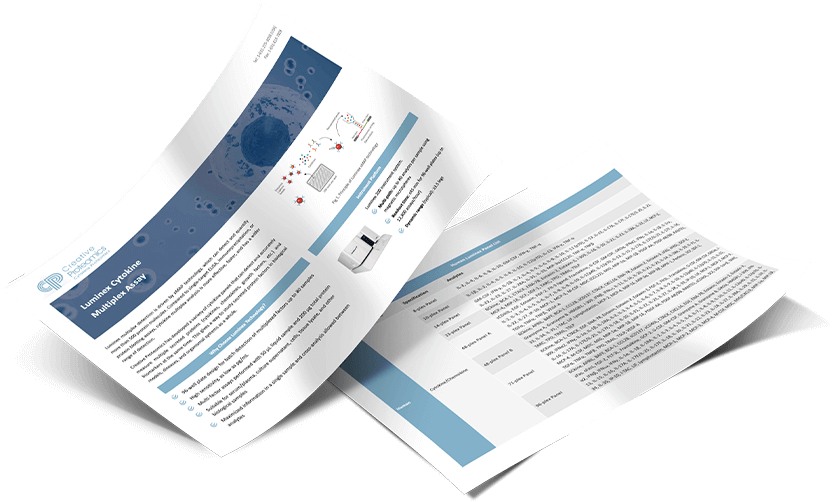Introduction
Creative Proteomics can simultaneously quantitatively detect diabetes-related cytokines and protein through a variety of technologies, and provide higher sensitivity and a wider detection range.
Type I diabetes (T1D) is an inflammatory autoimmune disease mediated by T cells characterized by specific damage to pancreatic β-cells. Macrophages and lymphocytes infiltrating pancreatic islets produce cytokines such as IL-1β, TNFα and IFN α, IFN-γ, tumor necrosis factor IL-2 and so on. These cytokines regulate the activation and population ratio of T cells through the apoptosis/necrosis of pancreatic β-cells, and regulate the immune recognition and killing of β-cells by T cells.
Type 2 diabetes (T2D) is a natural immune and inflammatory disease. Inflammatory factors include: 1. Immune inflammatory cells, such as white blood cells, are related to acute inflammation; 2. Acute phase reactive protein, such as CRP; 3. Inflammatory factors, such as TNF, IL, adiponectin and resistin, etc.; 4. Blood coagulation factors, blood lipids and other substances such as sialic acid and amyloid.

Cytokines involved in diabetes
TNF-α was closely related to IR and β-cell damage. TNF-α has multi-direction biological activity, which can induce the production of some pro-inflammatory factors, such as IL-6, IL-8, IL-10, etc., and cause acute inflammatory response, fever and the release of chemokines. Its functions include immune regulation, melatonin production, osteolysis, and proinflammatory response.
IL-1β plays an important role in the development of diabetes. It can regulate the expression of pro-apoptotic and anti-apoptotic genes in β-cells by activating the transcription factor nuclear factor-κB (NF-κB). IL-1β can stimulate the expression of Fas/Fas ligand (FasL) on β cells, and mediate β cell apoptosis with the participation of T cells. IL-6 is a multifunctional cytokine that plays an important role in immune and inflammatory reactions. It can promote the liver to synthesize acute phase proteins such as high-sensitivity C-reactive protein (hs-CRP), and promote inflammation and IR. IL-18 can be used as an independent predictive indicator of diabetes.
Low adiponectin levels are an independent predictor of T2DM and are associated with the risk of myocardial infarction.
CRP can stimulate vascular intimal proliferation and smooth muscle proliferation and migration, produce various cytokines, and induce cell matrix degradation, thereby participating in the progression of atherosclerosis in T2DM patients. CRP can also cause programmed apoptosis of β cells, and can also trigger oxidative stress and aggravate IR by inhibiting the activity of insulin receptor tyrosine kinase.
Detectable cytokines include but are not limited to:
Technology platform
We mainly provide the Luminex cytokine detection platform. Luminex uses fluorescently encoded microspheres with specific antibodies to different target molecules. The different microspheres can be combined freely to a certain extent so that up to 100 analytes can be tested multiple times simultaneously in a single experiment.
The Luminex cytokine assay platform has the following advantages:
- Multiple detection: simultaneous detection of 100 biological targets
- Short experiment time: 1-3 weeks
- High sensitivity: the lower limit of accurate quantification is as low as 0.1 pg/mL
- Save samples: only need a sample volume as low as 25 μL
- Time saving: the experiment process only takes 4 hours
For your different needs, we can also provide the following detection methods:
- Flow cytometry (FACS analysis): Identify and measure cell biomarkers in complex subpopulations. It can be used for intracellular cytokine detection without two hours.
- Enzyme-linked immunosorbent assay (ELISA): Use the primary antibody for capture, and conjugate the secondary antibody with an enzyme or radioisotope for detection. Our multiplexing system can detect the expression of multiple cytokines at once.
Sample preparation
- Suitable for serum, plasma, cell culture supernatant and all kinds of body fluids.
- The body fluid samples are stored in a refrigerator at -80 degrees Celsius and transported on dry ice.
Creative Proteomics can provide you with a one-stop solution. If you want to test other cytokines or other information you want to consult, please contact us. We are looking forward to cooperating with you.
Reference:
- Lu J, Liu J, Li L, et al. Cytokines in type 1 diabetes: mechanisms of action and immunotherapeutic targets. Clinical & Translational Immunology, 2020, 9(3): e1122.

